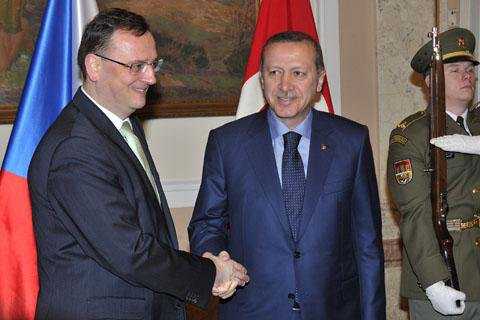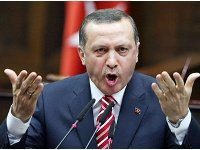A trilateral conference this month highlighted the possibilities – and limits – to Turkey’s new Central Asia diplomacy drive.
The recent Istanbul Security and Cooperation in the Heart of Asia conference has prompted a great deal of discussion, hardly surprising with media outlets running headlines like: “As NATO withdraws, Afghanistan’s neighbors make security pact.”
The only problem with this is that participants didn’t agree a pact with binding commitments, but rather a “vision” document with no means of ensuring that any of the principles and projects will actually come to pass.
Still, the issue is of significant interest, especially with the Obama administration having increased the number of diplomatic initiatives aimed at creating a favorable environment for an Afghan-led peace process. In her first appearance before Congress since returning from a week-long trip to Afghanistan, Pakistan and Central Asia last week, U.S. Secretary of State Hillary Rodham Clinton told the House Foreign Affairs Committee that the Obama administration’s Afghan-Pakistan war strategy is pursuing three mutually reinforcing tracks: “fight, talk, and build.”
But the United States is far from the only country boosting its diplomacy in the region. Turkey has also been complementing its longstanding military and economic contributions to Afghanistan with some regional maneuvering. Many of Turkey’s diplomatic initiatives have concentrated on improving relations between Afghanistan and Pakistan—or at least keeping their lines of communication open during their frequent bilateral disputes. Like the Obama administration (and other NATO governments), Turkish officials argue that any enduring solution to the conflict will require better relations between the governments of Afghanistan and Pakistan. In particular, Pakistani support is needed for inducing the Afghan Taliban to end its insurgency, since the insurgents use Pakistani territory as a base of operations.
Turkish officials say that their country has distinct advantages in this mediation role, including historically good relations with both countries, a shared Islamic faith, and a lack of local proxies or other incentives to interfere in their internal affairs.
Certainly, Turkey has provided extensive assistance to Afghanistan’s security – it has twice led the International Security Assistance Force (ISAF) and currently heads ISAF’s command for the Kabul region. On November 1, Turkey extended its command of the ISAF’s Kabul region for another year. And, while the Turkish government has refused to deploy its troops on explicit counterinsurgency or counterterrorist operations in Afghanistan, its military forces within ISAF have helped train members of the Afghan National Army and the Afghan National Police in these tactics. The Turkish government and Turkish non-governmental organizations have, for their part, supported many humanitarian and economic reconstruction projects in Afghanistan, including education, health, housing, and infrastructure improvement projects.
Turkey is helped in its regional efforts by its long-established good ties with Pakistan, dating from their alignment with the Western camp during the Cold War and their common moderate Muslim governments. Their military-to-military exchanges, which include a diverse range of bilateral and multilateral exercises, have continued to this day. In turn, Pakistan may have helped Turkey improve its relations with China and discouraged its Afghan Taliban allies from attacking Turkish troops in ISAF.
Since April 2007, Turkey has hosted six Turkey-Afghanistan-Pakistan Trilateral Forum meetings involving senior Turkish, Afghan, and Pakistani government officials. But it is determined to move beyond mere declarations. As part of the trilateral process, Turkey earlier this year organized a joint military exercise (on urban warfare) involving all three armies. A trilateral direct video-telephone conference line among the three presidents has also been established, and Turkish officials are now even considering initiating contact with the Afghan Taliban in support of peace mediation efforts.
The latest tripartite summit occurred on November 1, when Turkish President Abdullah Gul hosted Karzai and Pakistani President Asif Zardari in Istanbul. This was a useful step forward after the Taliban’s September 20 assassination of former Afghan President Burhanuddin Rabbani, which prompted an outraged Karzai to announce he was abandoning attempts to open talks with the Taliban and would instead deal with their Pakistani sponsors.
Through their engagement with the parties, Turkish officials concluded that the two governments were looking for a mechanism to resume their direct dialogue rather than “talking to each other via the media” and other indirect means. “We sense that they have a genuine wish to talk to each other because they realize this trend isn’t helping either of them,” one Turkish official told the press before the trilateral presidential summit in Istanbul.
But was there any substantive progress? The three governments signed agreements to cooperate in education, banking, and other areas, and also agreed to conduct more joint military exercises. Most notably, the three governments agreed to conduct a joint investigation into the Rabbani assassination to complement their individual efforts. Police, intelligence, military, and other representatives from the three governments will participate in this joint mechanism, and will be able to present and review evidence collectively.
Still, comments Afghan Deputy Foreign Minister Jawed Ludin’s made to the media after the event make it clear that while the meeting may have ended their public feuding for now, only genuine progress on concrete issues will generate enduring forward momentum in their relations: “So we are at a stage where we need to move beyond words, beyond expressions of commitments. We need to get to a stage where we actually do concrete things that will address our concerns with regard to our security.”
The multinational summit that met in Istanbul the following day was aimed to do just that. Formally entitled the Security and Cooperation in the Heart of Asia conference, the meeting was held at the Ottoman-era Ciragan Palace in Istanbul. Representatives from Afghanistan, China, India, Iran, Kazakhstan, Kyrgyzstan, Pakistan, Russia, Saudi Arabia, Tajikistan, Turkey, Turkmenistan, Uzbekistan and the United Arab Emirates attended the event as full participants and wrote the collective conference communique. These self-designated “Heart of Asia” countries were joined by senior officials from other supporting countries and international institutions, including the United States, many EU countries, and the United Nations.
But the most important development, missed by much of the press, was that the Istanbul conference saw a major behind-the-scenes dispute between Turkey and Pakistan. The result was to limit the conference’s role to that of offering a vision of harmonious regional security architecture. And, although the conference communiqué is an improvement over the even vaguer 2002 Kabul Declaration on Good Neighborly Relations, it’s still primarily a statement of principles and projects without a means to finance them.
The problems Turkey faces in trying to secure a breakthrough are similar to those encountered by the U.S. and other third-party facilitators, including the region’s porous borders, which facilitates the flow of fighters and drugs; poor governance; transnational organized criminal groups that have an interest in sustaining the conflict; week national governments and security forces have facing major Islamist insurgents; and limited and declining commitments by external powers to support regionally driven peace programs.
In addition, the Afghan-Pakistan conflict has elements of a civil war in which the Taliban enjoys some support among the large Pashtun community that straddles the Afghanistan-Pakistan border. For this reason, regionally based peace efforts will invariably struggle unless accompanied by complementary developments in Afghanistan and Pakistan such as more effective governance, better counterinsurgency operations, and a greater desire on the part of the insurgents to lay down their arms and reenter their civilian societies.
And regional rivalries have also impeded Turkey’s peace efforts. While Russia, China, and the West now generally support the same goals, Turkey has found it just as difficult as other countries to manage the India-Pakistan rivalry. The Indians complained when they weren’t invited to the trilateral summits between Afghanistan, Pakistan, and Turkey, as well as other Turkey-hosted gatherings on Afghanistan. Indians interpreted their exclusion as a sign that Turkey doesn’t respect India’s legitimate national security interest in Afghanistan.
This past year, Turkish diplomats addressed these concerns by including India in more of Turkey’s diplomatic initiatives regarding Afghanistan, but the shift has irritated Pakistan. Indeed, some Pakistani analysts accuse Turkish officials of distancing themselves from Islamabad’s interests in Afghanistan in order to please Washington “at Pakistan’s expense.” Meanwhile, the main Turkish opposition party, the Republican People’s Party, has attacked the Turkish government for seeking to cooperate with the Taliban (which they denounce as a terrorist group) by considering establishing a Taliban representation bureau on Turkish territory.
Still, the first Istanbul meeting appears to have at least stabilized relations between the Afghan and Pakistani governments. Their leaders have ceased denouncing one another in public. But the impact of the second larger meeting will only become evident during the next few months, when a number of major international conferences regarding Afghanistan will occur in Bonn, Chicago, and then in Kabul in June 2012.
The problem is that although there have been dozens of major international conferences during the past decade, their impact on Afghanistan has remained less than that of the actions of certain individual key actors, especially the governments of Pakistan and the United States as well as the Taliban. Perhaps the impending NATO military withdrawal will galvanize greater efforts to avert a transnational civil war in Afghanistan as the neighboring states wage proxy conflicts—using local Afghan actors as well as their preferred international institutions—among themselves at Afghanistan’s expense.
Another question is whether Turkey’s diplomatic ambitions extend beyond the Afghan issue? There’s growing talk that Turkey may try to formalize ties with the Shanghai Cooperation Organization (SCO) in order to expand its diplomatic toolkit regarding Afghanistan. In June, Chinese Assistant Foreign Minister Cheng Guoping told a Beijing news conference that the Turkish government had indicated through diplomatic channels that it wanted to become a “dialogue partner” of the SCO. In itself, that status would give Ankara a very circumscribed role within the SCO, but it could provide a springboard from which Turkey could then transition to become a formal observer or a full member of the SCO.
Earlier this year, Kazakh officials and the Russian press discussed Turkey’s acquiring some kind of formal affiliation with the SCO, but the Turkish diplomats I met last month in Ankara disclaimed any interest in obtaining some kind of official affiliation with the SCO. I remarked at several meetings in Turkey that some in Washington might see Turkey’s entry as a means to help keep the SCO from moving in an anti-Western direction by diluting Moscow’s and Beijing’s domination of the organization. But they seemed unenthusiastic about Turkey’s playing that role within the organization.
Yet Turkey’s ambitions to influence developments regarding Afghanistan may be leading Ankara to change its position. The SCO has been seeking to expand its role in the Afghan conflict and, for example, plans to hold a large Regional Economic Cooperation Conference on Afghanistan next year. Washington should therefore use its newfound influence in Ankara to encourage such a development.
Not only does Turkey share more Western values than the other SCO members, but Turkey could specifically help keep the SCO aligned with NATO, the EU and other international institutions establish a benign regional security, economic, and diplomatic framework in which the Afghans might just be able to resolve their own differences enough to avert the impending catastrophe.






